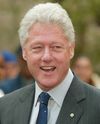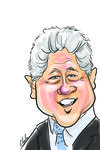Bill Clinton
William Jefferson Bill Clinton born William Jefferson Blythe III was the 42nd President and the third youngest President of the United States of America. He is married to former Senator and current Secretary of State Hillary Rodham Clinton and their only child is Chelsea Victoria.
 |
 |
| Country: | USA |
| Website: |
|
Early Life
President Bill Clinton was born in Hope Arkansas on August 19, 1946. He was named after his father William Jefferson Blythe II, who died in a car accident before Bill was born. His mother Virginia Cassidy Blythe is a nurse and re-married to an automobile salesman, Roger Clinton. Bill decided to legally change his surname from Blythe to Clinton when he was a teenager. During his senior year in high school, Bill was among the students chosen to participate in the Boys Nation, a special youth leadership conference in Washington D.C. who meet President John F. Kennedy at the White House. Meeting President Kennedy was one of his most important and memorable experience and it served as an inspiration for him to become President of the United States and serve his countrymen. Dr. Martin Luther King Jr. also inspired Bill particularly his "I Have a Dream" speech. Clinton considers Dr. King as one of his heroes.[1]
Educational Background
Bill Clinton graduated with a degree in Bachelor of Science in International Affairs at Georgetown University. He also studied Government at Oxford University in England after receiving a Rhodes Scholarship in 1968. After studying in England, he enrolled at Yale University where he earned his degree in Law in 1973.[2]
Public Service
He returned to Arkansas after graduating Law from Yale in 1973 and taught Law at Arkansas University. In 1974, Bill Clinton lost his first attempt to enter politics as a Congressman against Republican incumbent John Paul Hammerschmidt. In 1976, he became Attorney general of Arkansas. Two years later, he was elected governor and became the youngest governor in the United States. He lost his bid for his second term as governor 1980. In 1982, he was re-elected as governor under the Democratic Party. He served as governor of Arkansas until 1993 and became chairman of the National Governor Association from 1986-1987.[3]
In 1991, Clinton was nominated as the Democratic Presidential candidate and selected Al Gore as his Vice-Presidential running mate. He defeated President George Bush and independent candidate Ross Perot during the 1992 presidential election and he became the 42nd President of the United States while Al Gore became 45th Vice-President. Clinton was known as the "New Democrat." In 1996, Clinton and Gore served their second term as President and Vice President of United States. Clinton was the only president under the Democratic party who served a second term after Pres.Franklin D. Roosevelt.[4]
As President Clinton enjoyed high approval ratings and succeeded in implementing progressive reforms such improvement of the welfare system, strengthened environmental regulations, established the framework for global electronic commerce, created more jobs, succeeded in expanding international trade and peace initiatives in Africa, Middle East and he also promoted a framework for peace to end the conflict in Northern Ireland. Clinton left the White House with a budget surplus.[5]
Internet Policy
Framework for Global Electronic Commerce
In 1997, the Clinton Administration chief policy advisor Ira Magaziner drafted a Framework for Global Electronic Commerce under the instruction of President Clinton. It is a working paper which supports private sector involvement in the development of the internet, a uniform legal code in the cyberspace and the use of internet as a global free-trade zone. He also advised his cabinet secretaries to change their departments internet regulations and policies if it does not coincide with the framework.[6]
In his speech during a ceremony at the White House on July 1, 1997, President Clinton stated:[7]
If we establish an environment in which electronic commerce can grow and flourish, then every computer will be a window open to every business, large and small, everywhere in the world.In many ways, electronic commerce is like the Wild West of the global economy. Our task is to make sure that it's a safe and stable terrain for those who wish to trade on it, and we must do so by working with other nations now while electronic commerce is still in its infancy.
The 5-Point Principle Supported by the Magaziner Framework for Global Electronic Commerce include:[8]
- The private sector must lead in the development, innovation and expansion of the internet and electronic commerce
- Governments should avoid undue restrictions on electronic commerce
- The main objective of the government is to support and enforce a predictable, minimalist, consistent and simple legal environment for commerce in the event a governmental involvement is needed
- The unique qualities of the Internet should be recognized by governments
- Facilitation of the electronic Commerce over the Internet should be done on a global basis
